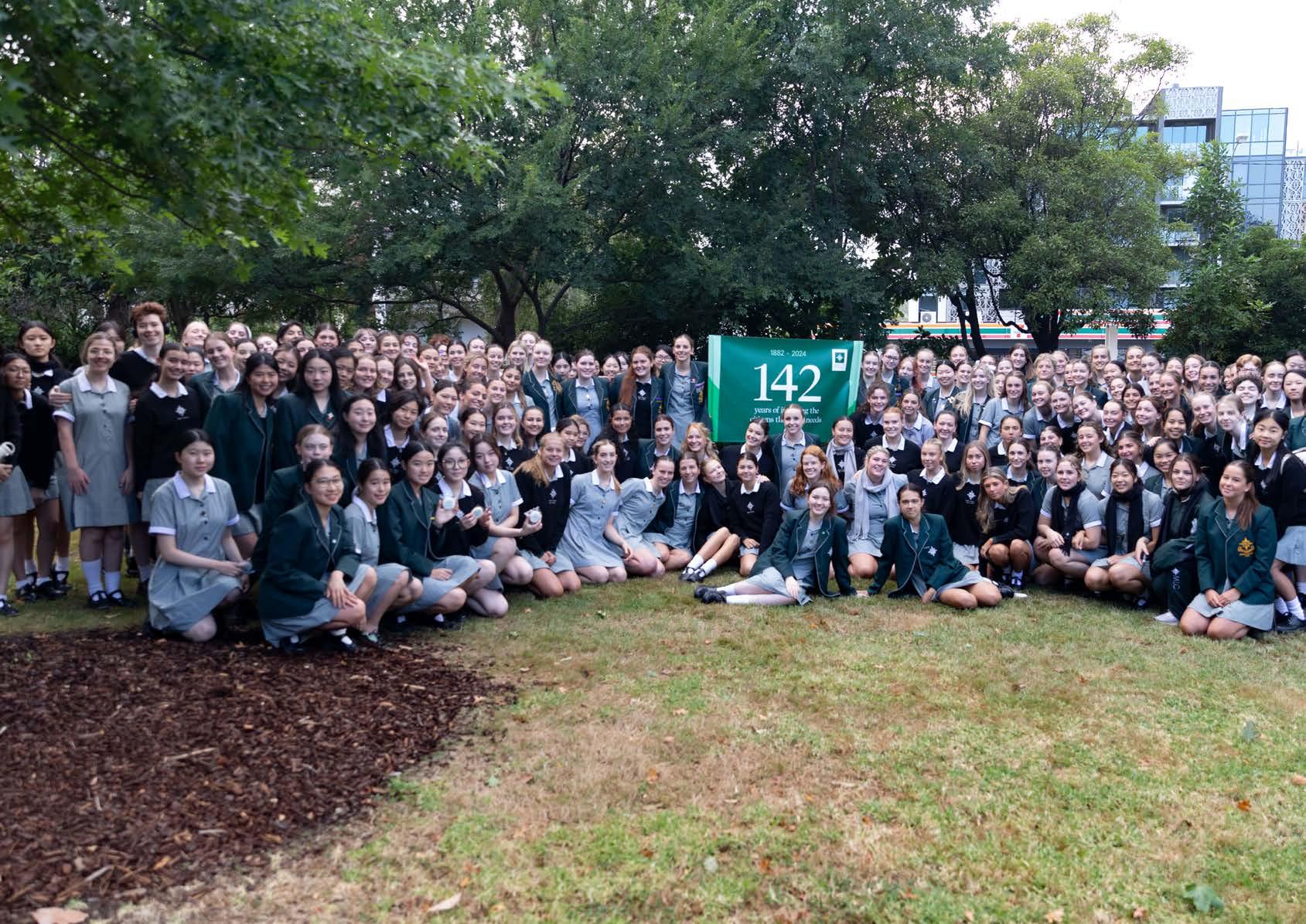

Principal’s Introduction
It is my pleasure to present the 2024 MLC Community Report, outlining the key achievements, operational milestones, and progress towards our strategic goals as we completed our Strategic Plan 2018–2024 and laid the foundations for MLC’s next chapter.
This was a year of both reflection and progress. Our focus was on delivering the key actions shaped over the past six years, with the extension of the plan giving us the opportunity to recover fully from the disruptions caused by the pandemic in 2020 and 2021.
As one of Australia’s leading girls’ schools, MLC is dedicated to inspiring our students to become citizens the world needs, through an unmatched breadth of integrated learning and wellbeing experiences that develop independent, resilient and ambitious learners. Our aim is to ensure that each student’s individual interests and talents are supported and nurtured, and ultimately, they are empowered to achieve their best.
A major milestone in 2024 was the launch of our evolved Curriculum for Learning and Wellbeing for Years 7 to 12. Developed with extensive input from students, staff, parents, alumnae and education experts, the curriculum integrates learning and wellbeing into every student’s day. It provides a balance of academic breadth and depth, clear pathways from junior secondary to senior years, and stronger teacher–student relationships through regular group and
individual mentor sessions. This approach reinforces learning, supports wellbeing, and continues to offer one of the most extensive subject choices of any girls’ school in Australia. Staying true to our commitment to continuous improvement, and drawing on feedback from parents, students and staff, we have already identified areas to refine the curriculum and other aspects of College life in the year ahead.
Our broader educational experiences also thrived. Students embraced cocurricular programs, house and year-level activities, and leadership opportunities, and we welcomed the return of our student exchange program with sister schools in the UK and Japan.
In 2024, your support helped transform the Junior School library into a vibrant, futurefocused space for curiosity, creativity, and connection. We also expanded the reach of our means-tested scholarship program, opening new opportunities for girls whose potential is now being realised through an MLC education.
None of this would have been possible without the strength of our community— parents and families, staff, alumnae, past
families, friends of the College, volunteers, our Board of Directors and Stakeholder Members—whose commitment to girls’ education remains unwavering. Your time, expertise and generosity continue to shape MLC’s future, and I extend my heartfelt thanks.
In 2024, we also began shaping our next Strategic Plan, inviting ideas and aspirations from students, staff, parents, alumnae and partners. This collective vision will guide the next stage of MLC’s journey, building on more than 140 years of empowering young women.
Ultimately, everything we do is for our students. We want them to leave MLC with the skills, confidence and character to thrive in the world beyond our gates. This report provides an overview of the key achievements, milestones and operations of 2024, and reflects our shared commitment to continually strengthening the learning and wellbeing of every student.
Julia Shea Principal
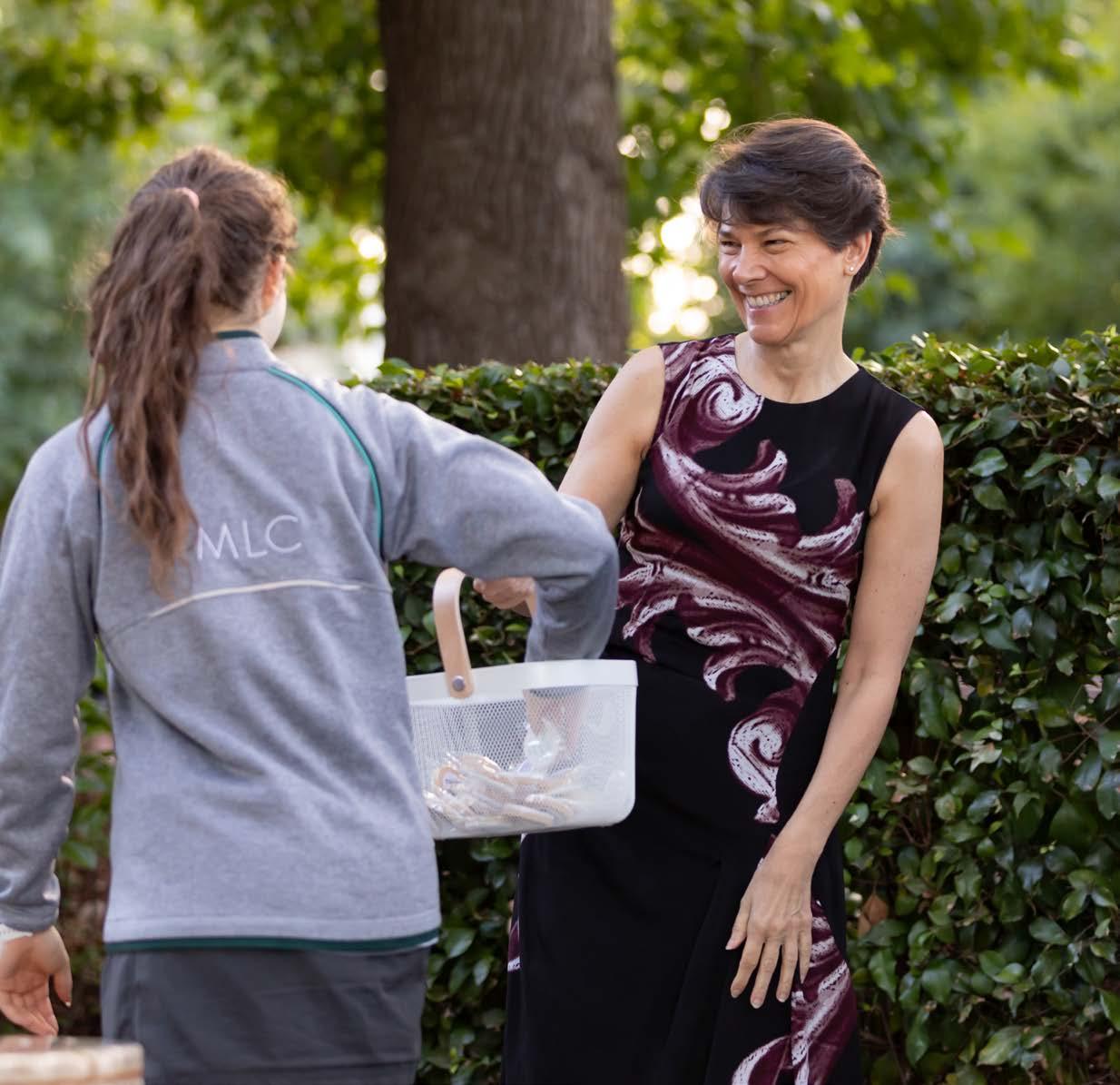
Our Vision, Mission and Values
An MLC education inspires our students to be citizens the world needs.
Values
The MLC values articulate what we stand for and aspire to, guiding the culture we foster and the behaviours we expect of everyone in our community:
MLC, as a leading girls’ school, develops and nurtures a community of independent, resilient, ambitious learners, by providing an unmatched breadth of integrated learning and wellbeing experiences and environments.
Principal Julia Shea welcoming students to the annual MLC Founders Day celebrations at the Krome Gates on the morning of 14 February.
Strategic Plan 2018 — 2024
This year, we completed the final year in MLC’s extended Strategic Plan – closing the chapter on this stage in our journey of developing and adapting the College in an evolving world.
The delays caused by the necessary response to the pandemic in 2020 and 2021 meant we needed to extend our Strategic Plan, launched in 2018, to the end of 2024. This ensured we could complete key activities such as embedding the evolved Curriculum for Learning and Wellbeing for Years 7-12.
The Plan features six Strategic Pillars, fundamental to MLC’s commitment to successfully educating and preparing students to navigate their journeys independently and confidently beyond Year 12 and supporting them to make a valuable contribution to their local and global communities.
Our Strategic Plan positions MLC at the forefront of ongoing innovation and achievement in education.
Student Learning and Achievement
MLC provides a broad and challenging academic curriculum that fosters a passion for learning and focuses on excellence, whilst developing independent, creative and adaptable thinkers.
Innovation and Resources
MLC will continue to lead and innovate in developing resources, sites, programs and facilities that support our students in a vibrant learning environment.
Our Community
MLC is an open-entry, nonselective school that welcomes students of all cultural, religious and economic backgrounds.
Our community includes current students, parents and staff, our network of alumnae and past families, friends of the College, volunteers, our Board Directors and Stakeholder Members.
The Board of Directors is comprised of members of our community who volunteer their time and expertise to support MLC. They have an ethical and financial obligation to act in the best interests of the College and its students.
Our Stakeholder Members are comprised of a combination of parents, alumnae, and additional member positions in accordance with the College constitution. They maintain an interest in the operations and governance of the College
Student Wellbeing
The College offers age-appropriate, sequential and integrated programs within a responsive student wellbeing framework to develop resilient young women who are confident to make positive choices in life.
MLC Community
The diverse and extensive MLC community provides a rich source of opportunity, personal growth and a sense of belonging for all members.
Total students 2,261
Excellence in Staff
MLC is committed to recruiting highcalibre staff and to providing valuable and relevant Staff Learning programs.
We recognise that quality educational outcomes are driven by excellence in teaching and learning provided by the highest quality, motivated teaching and educational support staff.
Secure Future
MLC is committed to a secure and sustainable future that supports investment in facilities and resources which deliver a world-class education for MLC students.
122
73 1,843 1,055
2,139 20,000+
including full-time, part-time and casual
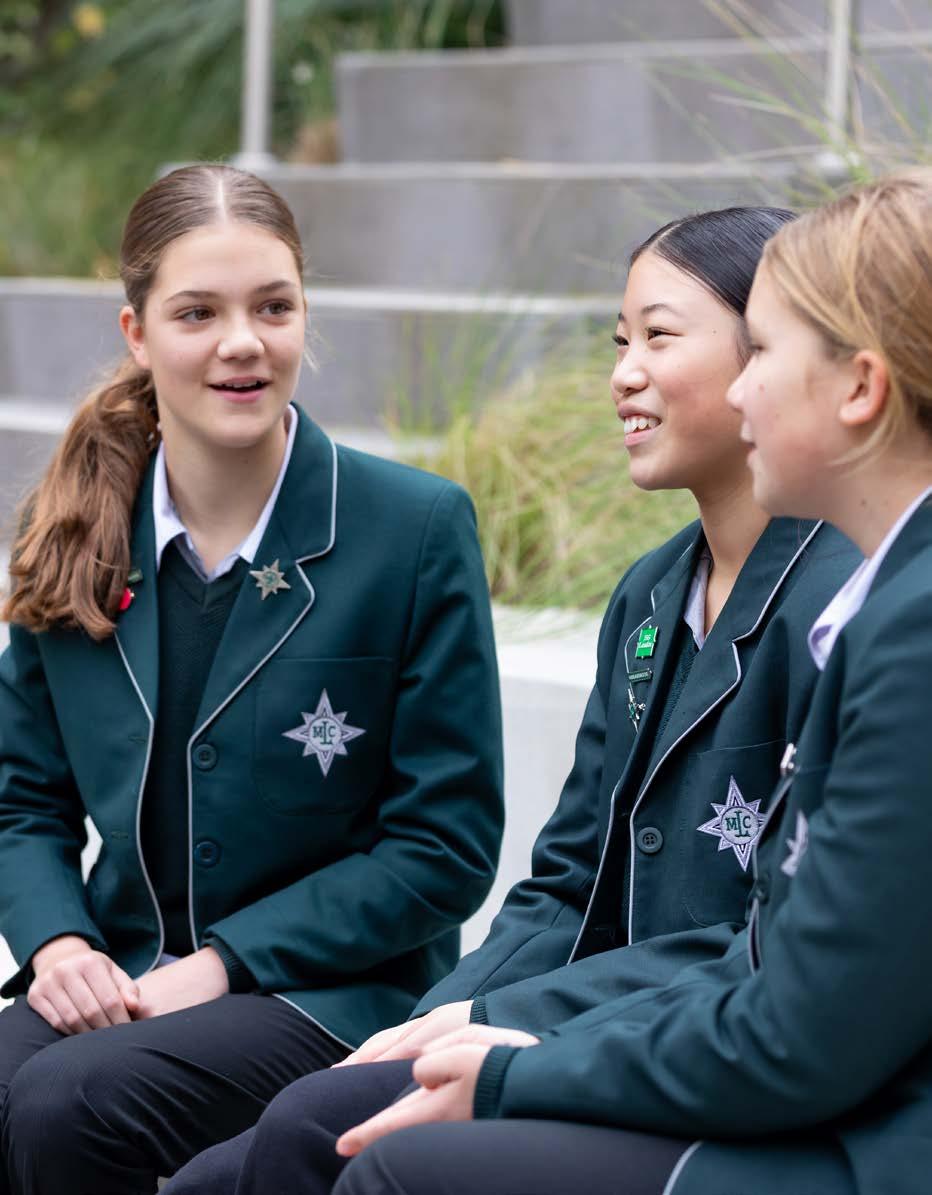
Our Students
Attendance
There are times when students may be absent due to a variety of reasons, such as illness, injury, religious observance, and family commitments, including liaison with parents. The College follows up on and records reasons for student absences and manages these electronically on a continual basis via each school section office. The schools support absent students and their families through regular contact from the Mentor or Class Teacher and/or Subject Teachers and Student or Section Coordinators as relevant for different year levels.
Wellbeing
The Resilience Survey has been taken anonymously by MLC students in Years 5-12 over the past nine years. In 2024, it was predominantly administered onsite at Kew campus in Term 2, allowing a snapshot in time and cross-sectional analysis, together with longitudinal and time-lag analysis. MLC uses the Australian norm data to benchmark MLC data against students from over 800 schools across Australia.
The College uses the data to review and plan wellbeing programs, co-curricular activities, and teaching and learning initiatives, ensuring alignment with the newly introduced Curriculum for Learning and Wellbeing in the secondary years and the Junior School curriculum.
In 2024, the College launched the evolved Curriculum for Learning and Wellbeing, which introduced a dedicated Health curriculum in Years 7-10 and fortnightly individual learning and wellbeing check-ins for each student with a dedicated Mentor in secondary years (Years 7-12). Health and wellbeing topics continued to be integrated into the Junior School curriculum.
Learning engagement was strong across the board, with students reporting they enjoy learning new things and were prepared to try hard at school.
Students consistently reported that ‘I am doing pretty well’, and that they felt they had positive relationships at home, with teachers and with their peers. Students reported that their teachers cared about and encouraged them, and the College will seek to reinforce this in the coming year by identifying behaviours that students recognise as encouraging.
Socially, students reported that they had at least one good friend at school, with a high level of trust between friends, and that they felt socially included. Students also reported that they could get along with people who were different from them, and could disagree about things and still be friends. MLC results also reflected students’ feelings of safety at school and that bullying rates at school and online were consistently lower than the Australian norm.
The results saw MLC students report attitudes that contribute to the development of resilience, including drawing on past experience to help them in future, and a belief in their ability to solve problems.
While MLC students participation in extra-curricular activities is high, the College will continue to seek to boost participation, with a particular focus on maintaining
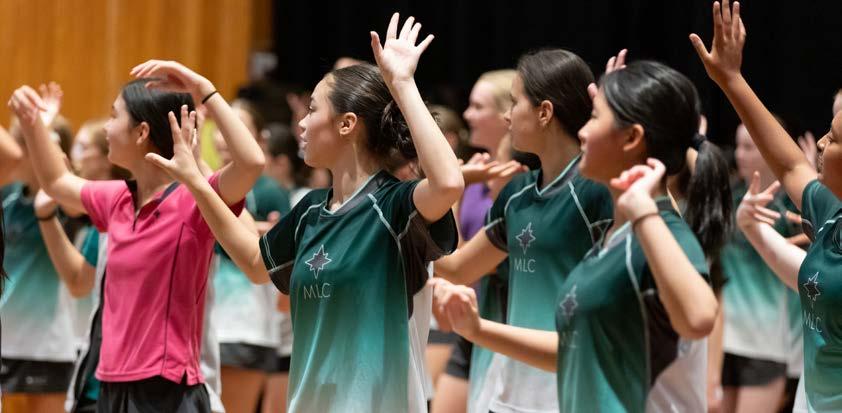
students willingness to undertake physical activity, such as sport and exercise, as they move through their schooling.
Action plans in response to themes and school-specific data were developed to ensure that our Wellbeing Programs address identified issues. Implementation commenced in Term 4, 2024 and continued into 2025. Areas for ongoing focus in 2025 will include continuing to support students in developing feelings of personal wellbeing and resilience, building their feelings of connectedness with their peers and the College, and creating opportunities for students to further develop a sense of agency and efficacy.
2025 targeted wellbeing initiatives are being planned in the areas of:
– Further evolving the structure of Mentor Groups to support development of studentteacher and peer-to-peer relationships
– Continuing to encourage healthy behaviours in the areas of sleep and other lifestyle factors, as well as education in risk-factors such as drug, alcohol and other risk-taking behaviour
– Diversity initiatives that promote inclusivity, including gender and sexuality equity
– Respectful relationships with self and others as well as consent
– Mental health literacy by promoting both self-support techniques and help-seeking behaviours
– Implementation of tools to bolster focus, digital safety and development of selfmanagement behaviours
– Introduction of a College-wide mobile phone and wearable device policy
MLC will also continue to support student wellbeing through resourcing and time allocation for the College’s Wellbeing and Student Counselling teams, providing access to individualised wellbeing support.
Year 8 students participating in their annual Health Day.
Student Outcomes
Literacy and Numeracy Average Student Results
MLC students continue to perform well against national averages. Table 2 (below) shows the year-level averages for MLC students and National scores based on 2024 NAPLAN results.
Five-Year Trend in Year 9 Average Standardised Assessment Results
The average standardised assessment results for Year 9 are based on NAPLAN results for 2024 and include international students for whom English is an additional language. The results indicate that the average achievement of MLC students is above state-wide average achievements in all areas assessed by NAPLAN. Derived from the five-year trend data report. Table 3 (below) indicates improvement in all areas assessed.
Note: data derived from the Five-Year Trend data report 2019-2024 (NAPLAN was not conducted in 2020). 2024 Results
Our overall results in 2024 once again saw MLC students achieve some of the highest ATAR scores in the state.
The combined VCE, VCE VET, and IB Diploma results continue the College’s longstanding tradition of academic excellence across a broad range of subject disciplines.
VCE and VCE VET Highlights
Across our VCE students, 10 students received perfect study scores in nine subjects, including Chinese Second Language (1), English (2), English Language (1), Food Studies (1), History: Revolutions (1), Legal Studies (1), Literature (1), Mathematical Methods (1), and VET Hospitality: Cookery (1).
Nine students were awarded Premier’s VCE 2024 Study Awards in Chinese Second Language, English, English Language, History Revolutions, VET Hospitality, VET Hospitality: Cookery, Legal Studies, and Mathematical Methods.
IB Diploma Highlights
Among our IB Diploma candidates, three students achieved a perfect score of 45, and another five students achieved 44. 35% of MLC’s IB Diploma cohort achieved a score of 40 or above. The median ATAR for the IB Diploma cohort was 92.15% with 23.5% scoring an ATAR of 99 or above.
Five-Year Rolling Average in Year 12 Results
University Offers
Reflecting the breadth of opportunity offered by MLC’s all-girls education, the Class of 2024 received offers to take up further study in a wide range of institutions in Australia and overseas. The diversity of study areas in the courses offered reflect the breadth of pathways available at the College, and included areas such as the arts, business, commerce, engineering, health, medicine, and sciences. 81% of our Year 12 cohort received an offer for their first or second preference for university courses.
As in previous years, a number of students were offered places in universities in the UK (Durham University, King’s College London, Oxford University, University College London, University of Manchester, University of St Andrews, University of the Arts London, University of Warwick, and The University of Edinburgh) and the US (Brown University and the University of Michigan).
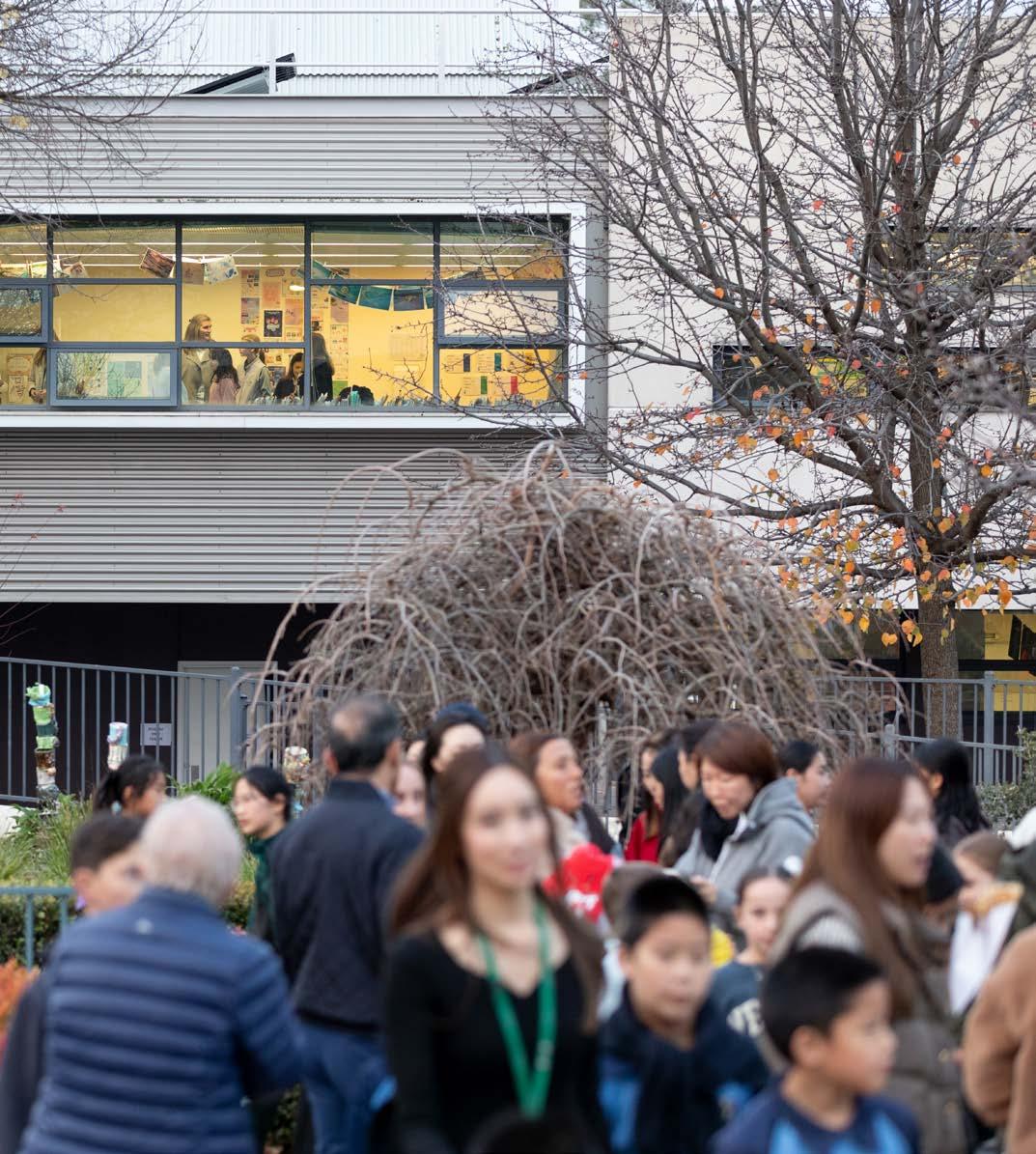
Parent and Staff Satisfaction
In 2024, MLC introduced enhanced feedback mechanisms for parents and staff to provide more timely, nuanced and actionable insights. These surveys help us identify strengths, areas for growth, and opportunities to strengthen the MLC experience for every student and family.
Parents
In 2024, MLC piloted two new feedback mechanisms for our parent community, with the aim of gathering more timely, nuanced and actionable feedback than was provided in previous surveys.
This approach saw the launch of a dedicated New Parent Survey at the end of Term 1. This was sent to all families who had their first daughter commence at the College in 2024, to gather feedback on their experience in joining our community. This was followed up in Term 4 with a pilot of a new Parent Satisfaction Pulse Survey, which was sent to all families.
New Parent Survey
This survey focused on the onboarding experience for families whose first daughter commenced at MLC in 2024. Overall, 90% of new parents indicated they were satisfied or very satisfied with MLC, with 74% of respondents saying their experience exceeded expectations. More than four in five parents said they would recommend MLC to a friend or colleague, an exceptionally strong endorsement for families new to our community.
Parent Satisfaction Survey
A trial of a new format for the Parent Satisfaction Survey was conducted in December 2024.
Overall, 80% of parents indicated they were satisfied or very satisfied with MLC. Parents highlighted our wide range of opportunities, the balance between academics and wellbeing, high-quality facilities and resources, and a strong sense of belonging as key strengths.
Feedback from both surveys is helping to guide further improvements, including strengthening teacher-student connections and enhancing how we communicate curriculum and progress updates to parents. With the introduction of the evolved Curriculum for Learning and Wellbeing in 2024 and improvements to key communications systems in 2025, we expect to see further positive shifts in these areas.

Staff
In July 2024, the College introduced six monthly online surveys via the Culture Amp platform as the new method for measuring staff engagement, with the aim of capturing actionable feedback.
This shift to Culture Amp enables us to analyse data across different staff cohorts, to monitor shifts over time, and to compare MLC to education sector benchmarks on various elements of staff experience. Survey insights inform priority actions at an overall College level via our People Strategy, as well as department-specific actions to support enhanced staff engagement and wellbeing, and a high performance culture.
Priority actions arising from survey feedback have included introducing more opportunities for cross-College connection, the establishment of a Staff Wellbeing Team, and additional mechanisms for reward and recognition.
The annual Junior School Learning Showcase invites families to explore learning and classrooms across the whole of Junior School.
Deputy Head of Junior Secondary School, Ms Penny Church speaking with students.
Our Staff
Excellence in staff is a core priority for MLC. We recognise that quality educational outcomes are driven by excellence in teaching, learning, and wellbeing, which is provided by the highest-quality, motivated teaching and educational support staff.
Throughout 2024, MLC continued to implement measures to support our staff across all three campuses. Our teaching staff continued to adapt their approaches and innovate throughout the year as they brought the evolved Curriculum for Learning and Wellbeing to life, supported by curriculum leaders.
Together with the continual refinement of the Junior School curriculum, the introduction of the Curriculum for Learning and Wellbeing in Years 7 to 12 ensures that MLC continues to provide students with an academically robust education, strengthened by a deep sense of connection and belonging to the College and the MLC community.
This report covers the period of the 2024 College operational year, from 1 January to 31 December 2024.
The ongoing impact of continued inflation on key operational expenses, the necessary wage growth for staff, and the collection of a number of State Government levies factored into increases in operating expenses. As a result, the College applied an average rise of 7.5% in Tuition Fees in the 2025 school year.
